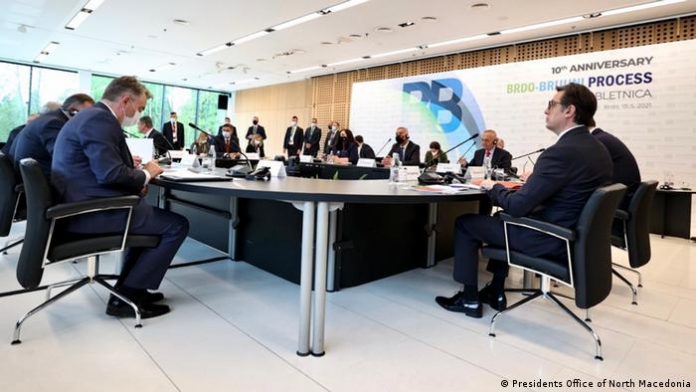Macedonia’s President Stevo Pendarovski took part in the annual Brdo-Brijuni Process in Slovenia, where the leaders of seven Balkan nations, including Kosovo, met for the tenth time.
The summit is usually focused on the EU integration process of the Western Balkans and culminates with declarations for understanding and cooperation. This is the usual diplomatic rhetoric that receives little factual follow-up, considering the EU’s lack of continued interest in seeing meaningful changes.
This edition of the summit appeared to be different. The declarations at the end of the event emerge in a specific geopolitical climate set against an EU which is in the process of recovering from the shock caused by the covid pandemic, the migrant crisis and Brexit.
Presently, the integration of the Western Balkans region is at a standstill and doesn’t appear high on the Portuguese agenda. The reason for this is the “enlargement fatigue” caused not only by the Kosovo-Serbia problem but also by Bulgaria’s veto to Macedonia.
The latter incident slowed down the general dynamic and enthusiasm for the EU in the Western Balkans.
As it was hoped in the case of Macedonia and Greece signing, virtually, a peace agreement, or the terms of a historic surrender seen from the perspective of Macedonians, pro-enlargement actors were hoping that an agreement between Macedonia and Bulgaria will generate a meaningful push to the Kosovo Serbia dialogue.
The opposite happened. Macedonian heads of state continue hearing declarations of support for the 16th year in a row, without actual results. The rest of the region backslides every time Brussels demotes it low on the agenda.
On the other hand, the Brdo-Brijoni Process does represent a warm-up in Western Balkan politics during Slovenia’s turn at the EU Presidency, which is coming soon.
As one of the two EU member states that are virtually part of the Western Balkans, by extension of the former Yugoslavia, Slovenia has played a traditional role in advocating for EU enlargement.
Brdo-Brioni has resulted in two main takeaways for Macedonia.
One is that Bulgaria has been called on (although, not by its name) by the heads of two other EU member states, to cut the nonsense and be a constructive player vis a vis Macedonia.
Croatia’s President Zoran Milanovic referred to Bulgaria for its incursions into Macedonia’s “intimate space by demanding that the country reformulates its own national genesis according to foreign demands” and declared that he will oppose Sofia’s incursion in its neighbour’s sovereignty.
Milanovic’s rhetoric was unambiguous and reflects sentiment in the EU in respect to Bulgaria: “If your objective is to destroy those who are weaker than you just because they are, it will never end well. This is one of the messages we sent as part of the Declaration,” stated Croatia’s President.
That a part of the EU is with Macedonia on this issue can be concluded from Zoran Zaev drawing a red line that doesn’t allow reformulating the historic background and authentic development of the Macedonian language and the national identity of its people in relation to Bulgaria.
The other takeaway for Macedonia is regarding the joint declaration of Croatia and Slovenia which demands of the EU to regard the region as a whole in terms of the enlargement process, during which Macedonia and Albania are expected to enter the negotiation process jointly.
Such wording may have been expected in view of the two “non-papers” that emerged recently and reached the highest rungs of the foreign policy latter in the EU and its Western Balkans potentials.
The mysterious papers promulgated the exchange of territories as a way of solving some of the burning issues in the Western Balkans – Bosnia’s functionality as a unitary state and the recognition of Kosovo and normalizing relations with Belgrade.
In other words, the non-papers offered the changing borders as a possible solution – a no-go zone for most European states, including Germany. Although the non-papers were dismissed as a provocation, their emergence suggests that some actors have considered exploring alternative ways of resolving open issues, such as that between Kosovo and Serbia.
It has become clear that the EU doesn’t have a toolkit of solutions for the Western Balkans and that each country drifts away under its own inertia during the lengthy breaks from cross-regional dialogues and processes.
One thing that Macedonia can hope to take away from this summit is a more solid hand in once the talks with Bulgaria restart which is imminent as now is the moment for the Western Balkans to depart from point zero.



